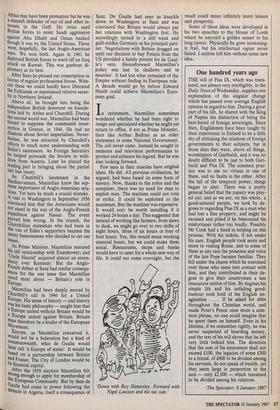One hundred years ago
THE will of Pius IX, which was trans- lated, not always very intelligibly, in the Daily News of Wednesday, supplies one explanation of the singular change which has passed over average English opinion in regard to him. During a great part of his life, he shared with the King of Naples the distinction of being the best-hated of foreign sovereigns. Since then, Englishmen have been taught by their experience in Ireland to be a little shy of criticising the relations of foreign governments to their subjects; but in those days they were, above all things, worshippers of Garibaldi, and it was no doubt difficult to be just to both Gari- baldi and Pius IX. The common prac- tice was to see no virtues in one of them, and no faults in the other. After the fall of the temporal power, things began to alter. There was a pretty general belief that the papacy was play- ed out; and as we are, on the whole, a good-natured people, we took by de- grees to regarding Pius IX as a man who had lost a fine property, and might be excused and pitied if he bemoaned his misfortunes rather too loudly. Possibly Mr Cook had a hand in helping on this process. With his tickets, if not under his care, English people took more and more to visiting Rome, and to some of them at any rate the presence and voice of the late Pope became familiar. They fell under the charm which he exercised over those who came into contact with him, and they contributed in their de- gree to give their countrymen a less inaccurate notion of him. By degrees his simple life and his unfailing good- humour took hold of the English im- agination . . . . If he asked for alms throughout the Christian world, and made Peter's Pence once more a com- mon phrase, no one could imagine that he spent them on himself. Even in his lifetime, if we remember rightly, he was never suspected of hoarding money, and the text of his will shows that he left very little behind him. The direction that the cost of his monument shall not exceed £100, the legacies of some £300 to a friend, of £600 to be divided among his servants, do not speak of wealth, yet they seem large in proportion to the sum — only £2,000 — which remained to be divided among his relatives.
The Spectator, 8 January 1887










































 Previous page
Previous page